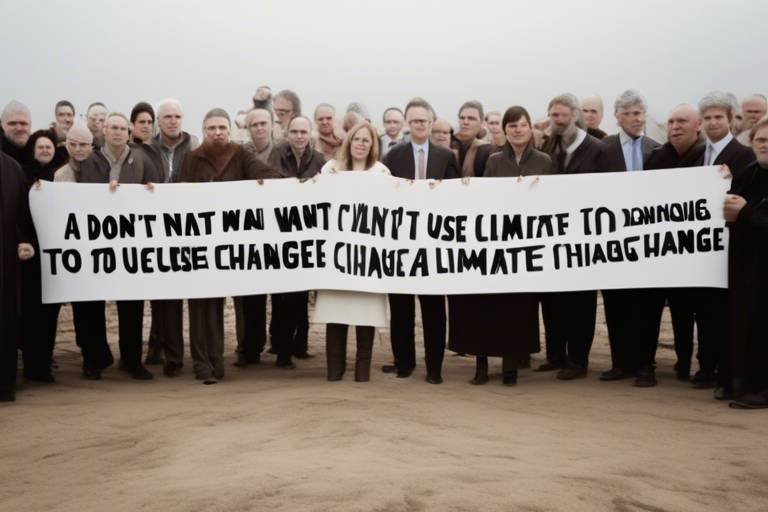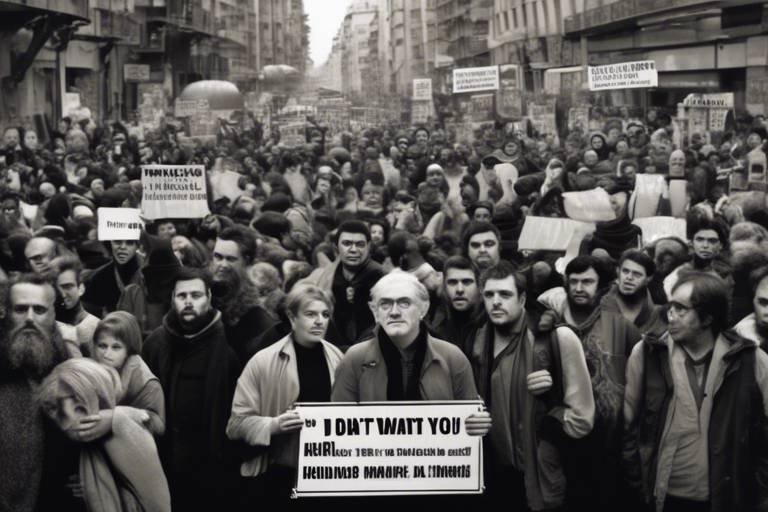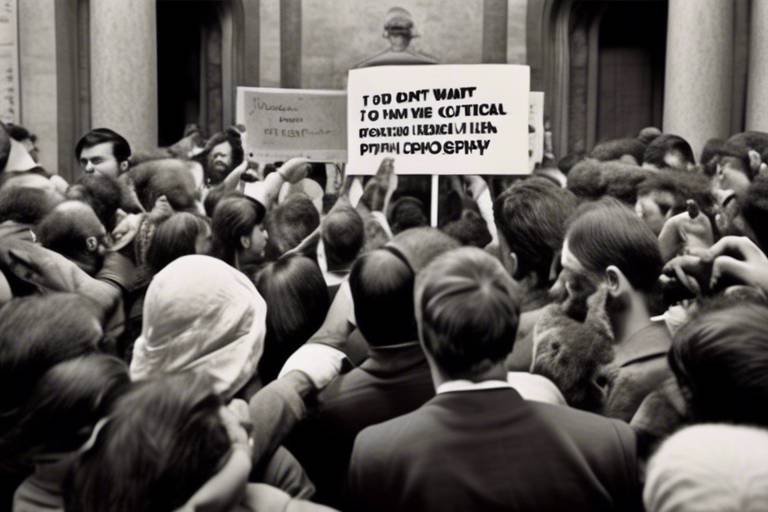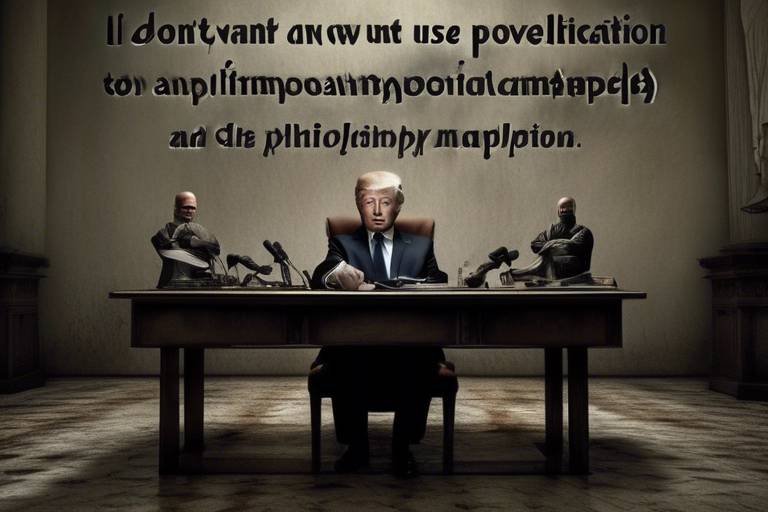Philosophy and the Politics of Arrest and Punishment
The intersection of philosophy and politics is a rich tapestry woven with complex threads of ethics, justice, and societal norms. When we delve into the realm of arrest and punishment, we uncover a myriad of questions that challenge our understanding of authority, morality, and the very essence of justice. Why do societies impose punishment? What philosophical justifications exist for the state’s power to arrest? This article aims to explore these profound questions, shedding light on the ethical implications of our legal systems and the societal impacts of punitive measures.
At its core, the philosophy surrounding arrest and punishment is not merely an academic exercise; it is a reflection of our values and beliefs as a society. The way we approach punishment can reveal much about our collective conscience. Are we inclined towards retribution, seeking to exact vengeance on those who transgress our laws? Or do we lean towards rehabilitation, believing in the capacity for change and the potential for individuals to reintegrate into society? These philosophical inquiries are not just theoretical; they have real-world consequences that affect lives, communities, and the very fabric of our social order.
As we embark on this exploration, we will examine the foundational theories of punishment, the role of authority in the arrest process, and the ethical dilemmas posed by preventive detention. Each of these elements plays a critical role in shaping our understanding of justice and the responsibilities of the state. Moreover, we will consider the implications for civil liberties and the ongoing debates about the balance between safety and freedom in contemporary governance.
Understanding the philosophy behind arrest and punishment requires us to confront uncomfortable truths about power dynamics and societal expectations. The authority wielded by law enforcement and the justice system can sometimes overshadow individual rights, leading to questions about legitimacy and consent. In a democratic society, the governed must have a say in how justice is administered, and the moral grounds for arrest practices must be scrutinized.
Ultimately, this discourse is not merely about laws and regulations; it is about human lives and the quest for a fair and just society. The consequences of punishment extend beyond the individual to impact families, communities, and the broader social landscape. By examining these philosophical and political dimensions, we can strive for a justice system that not only punishes wrongdoing but also fosters healing, understanding, and ultimately, a more cohesive society.
- What is the purpose of punishment in society? Punishment serves multiple purposes, including deterrence, retribution, rehabilitation, and societal protection.
- How does authority influence arrest practices? Authority shapes arrest practices through the discretion exercised by law enforcement, which can lead to ethical dilemmas and potential abuses of power.
- What are the ethical concerns surrounding preventive detention? Preventive detention raises issues related to human rights, the presumption of innocence, and potential biases in risk assessment tools.
- Are there alternatives to traditional punitive measures? Yes, restorative justice and rehabilitation focus on healing and community restoration rather than retribution.

Theoretical Foundations of Punishment
When we dive into the , we uncover a rich tapestry of philosophical thought that shapes our understanding of justice and societal order. At the heart of this exploration are three primary theories: retributive justice, utilitarianism, and restorative justice. Each of these perspectives offers a distinct lens through which to view the purpose and efficacy of punishment, raising critical questions about morality, fairness, and the role of the state.
Retributive justice is perhaps the most intuitive of these theories. It operates on the principle that punishment is a deserved response to wrongdoing. Imagine a scale, where the weight of a crime must be balanced by an equivalent punishment. This theory suggests that when someone commits an offense, they owe a debt to society that must be repaid through punishment. It’s a straightforward notion—if you harm someone, you should face consequences. However, critics argue that this approach can lead to a cycle of vengeance rather than genuine justice, often overlooking the potential for rehabilitation.
On the other hand, utilitarianism takes a more pragmatic approach. This theory posits that the primary aim of punishment should be to maximize overall happiness and minimize suffering. In this view, punishment is justified if it serves a greater good—such as deterring future crimes or rehabilitating offenders. Think of it as a strategic move in a chess game, where the ultimate goal is to create a safer and more harmonious society. However, this raises ethical dilemmas: can we justify punishing an innocent person if it results in a net positive for society? The complexities of this theory often lead to heated debates among philosophers and policymakers alike.
Finally, we have restorative justice, a perspective that shifts the focus from punishment to healing. This approach emphasizes the importance of repairing the harm caused by criminal behavior through inclusive dialogue among victims, offenders, and the community. Imagine a circle where everyone has a voice, and the aim is to foster understanding and reconciliation rather than retribution. Proponents argue that restorative justice not only addresses the needs of victims but also allows offenders to take responsibility for their actions, promoting a sense of accountability and personal growth. Yet, critics question whether this approach can be effectively implemented in all cases, particularly in situations involving severe harm.
To further illustrate these theories, consider the following table that summarizes their core principles:
| Theory | Core Principle | Focus |
|---|---|---|
| Retributive Justice | Punishment as deserved consequence | Individual accountability |
| Utilitarianism | Maximizing happiness and minimizing suffering | Societal good |
| Restorative Justice | Repairing harm through dialogue | Healing and reconciliation |
As we navigate these theoretical foundations, it becomes clear that the implications of each theory extend far beyond philosophical discourse; they influence legal practices and societal norms in profound ways. The challenge lies in finding a balance between these perspectives, ensuring that our systems of justice not only punish but also rehabilitate and restore. In a world where the stakes are high, understanding these foundations is essential for anyone seeking to engage with the complex issues surrounding arrest and punishment.
- What is the main difference between retributive and restorative justice?
Retributive justice focuses on punishment as a deserved consequence, while restorative justice emphasizes repairing harm through dialogue and reconciliation. - Can utilitarianism justify punishing innocent people?
Utilitarianism can theoretically justify punishing innocent individuals if it leads to a greater overall benefit, but this raises significant ethical concerns. - How do these theories impact modern legal systems?
These theories influence how laws are crafted, how offenders are treated, and the overall approach to justice in society.

The Role of Authority in Arrest
When we think about the role of authority in arrest, it’s like peeling back the layers of an onion—each layer revealing complex dynamics that shape our understanding of justice and governance. Authority is not just a badge worn by law enforcement; it is a powerful force that influences societal norms, individual rights, and the very fabric of our communities. The decision to arrest someone is not merely a mechanical process; it is steeped in power dynamics that can often lead to ethical dilemmas. How does authority decide who to arrest? What criteria are used? And importantly, how does this process affect our perception of justice?
At the heart of this discussion lies the concept of **police discretion**—the ability of law enforcement officers to make choices based on their judgment. This discretion can sometimes lead to **positive outcomes**, such as de-escalating a situation, but it can also result in **abuse of power**. For example, consider a scenario where two individuals commit similar offenses. If one is arrested while the other is let go, what criteria influenced that decision? Was it based on the officer's bias, the individual's background, or perhaps even the social dynamics at play? This is where the ethical considerations come into sharp focus.
Furthermore, the role of authority in arrest is often justified through frameworks like **social contract theory**, which posits that individuals consent to surrender some of their freedoms to the state in exchange for protection and order. However, this raises a crucial question: Is the consent given by the governed truly informed and voluntary, or is it coerced by the very authority that claims to protect them? The legitimacy of arrest practices in modern democracies hinges on this balance between individual rights and societal order.
When we dive deeper into the concept of consent, it becomes clear that legitimacy is derived from the governed. In a democratic society, citizens are expected to have a say in how laws are enforced and how authority is exercised. Yet, the reality often presents a different picture. Many people feel that their rights are trampled upon during arrests, leading to a sense of disillusionment with the very institutions meant to uphold justice. This tension between authority and individual freedom is a hotbed for philosophical debates, challenging us to rethink how we view law enforcement.
The implications of authority in arrest extend beyond individual cases; they ripple through society, impacting civil liberties at large. The question arises: How do arrest practices infringe upon individual freedoms? For instance, racial profiling and discriminatory practices can lead to a disproportionate number of arrests among marginalized communities. This not only fosters mistrust in law enforcement but also raises ethical concerns about the fairness of our justice system. As we navigate these complex waters, it’s essential to consider how authority can either safeguard or undermine civil liberties.
Finally, the consequences of punishment must be examined through the lens of authority. When authority figures wield their power to arrest, they are not just enforcing the law; they are shaping community perceptions of justice. **Punishment** can lead to a cycle of trauma, particularly for those who experience unjust arrests. The psychological impact of being arrested can linger long after the handcuffs are removed, affecting not only the individual but also their families and communities. This is where the conversation shifts from mere legality to the ethical implications of authority in arrest.
In summary, authority plays a pivotal role in the arrest process, influencing decisions that can have far-reaching consequences for individuals and society. As we continue to explore the intersection of philosophy and politics, it becomes clear that understanding the dynamics of authority is crucial for fostering a just and equitable society.
- What is police discretion? Police discretion refers to the authority of law enforcement officers to make decisions based on their judgment in various situations, including whether to arrest an individual.
- How does social contract theory relate to authority? Social contract theory suggests that individuals consent to surrender some of their freedoms to the state for protection and order, which justifies the state's authority to arrest and punish.
- What are the implications of arrest on civil liberties? Arrest practices can infringe on civil liberties by disproportionately affecting marginalized communities, leading to issues like racial profiling and mistrust in law enforcement.
- What are the psychological impacts of being arrested? The psychological impacts can include trauma, anxiety, and long-term effects on an individual's mental health and community relationships.

Social Contract Theory
The concept of is a cornerstone in understanding the philosophical justification for the state's authority to arrest and punish individuals. At its core, this theory posits that individuals consent, either explicitly or implicitly, to surrender some of their freedoms and submit to the authority of the state in exchange for protection of their remaining rights. This exchange is crucial because it establishes the legitimacy of governmental power; without this consent, the authority wielded by the state could be seen as arbitrary or tyrannical. Imagine living in a world where everyone acted solely on their own whims—chaos would reign, and societal order would collapse. The social contract, therefore, serves as a vital mechanism to maintain order and ensure justice within a community.
Furthermore, social contract theory raises compelling questions about the balance between individual rights and societal order. For instance, when does the state's need to maintain order infringe upon personal freedoms? This tension is particularly evident in discussions surrounding arrest practices, where the state must navigate the thin line between public safety and individual liberties. The philosophical debate often revolves around the following key principles:
- Consent: The legitimacy of state power is derived from the consent of the governed. Without this consent, any form of arrest or punishment could be viewed as an infringement on personal autonomy.
- Legitimacy: The moral grounds for exercising authority must be questioned. Is the state acting in the best interest of its citizens, or is it merely enforcing its will?
- Balance: The challenge lies in finding a balance between upholding societal order and protecting individual freedoms. This balance is often tested in high-stakes situations, such as during protests or civil unrest.
Moreover, the implications of social contract theory extend beyond mere philosophical musings; they have real-world consequences. For example, when individuals feel their rights are being violated, they may withdraw their consent, leading to unrest and a breakdown of trust in governmental institutions. This dynamic is particularly relevant in contemporary democracies, where citizens are increasingly vocal about their rights and the limits of state power. The challenge for modern governance is to ensure that arrest practices not only reflect the will of the people but also uphold the fundamental principles of justice and fairness.
In summary, social contract theory provides a framework for understanding the complex interplay between authority, individual rights, and societal order. As we navigate the challenges of modern governance, it is essential to continually evaluate the legitimacy of state actions, ensuring that they align with the principles of consent and justice. Only then can we foster a society where the rights of individuals are respected while maintaining the necessary order that allows communities to thrive.
- What is social contract theory? Social contract theory is a philosophical concept that suggests individuals consent to give up some freedoms in exchange for protection and order provided by the state.
- How does social contract theory justify arrest? It justifies arrest by asserting that the state has the authority to enforce laws that protect the rights of individuals, as long as this authority is derived from the consent of the governed.
- What are the implications of violating the social contract? Violating the social contract can lead to a loss of legitimacy for the state, resulting in public dissent, unrest, and a breakdown of trust between citizens and their government.

Consent and Legitimacy
The concept of consent is fundamental to understanding the legitimacy of state power, particularly when it comes to arrest and punishment. In a democratic society, the authority of the state is often viewed as a social contract between the government and its citizens. This contract implies that individuals consent to abide by laws and regulations in exchange for protection and the maintenance of order. However, the question arises: how much of this consent is genuine, and how much is coerced or manipulated?
Legitimacy is derived from the perception that the state acts in the best interests of its citizens. When the mechanisms of arrest and punishment are perceived as fair and just, individuals are more likely to view the state's authority as legitimate. Conversely, when arrests are conducted arbitrarily or disproportionately, the legitimacy of that authority is called into question. For example, if a community feels that arrests are racially biased or politically motivated, the social contract begins to fray, leading to a breakdown in trust between the state and its citizens.
To explore this further, let’s consider some key factors that contribute to the legitimacy of arrest practices:
- Transparency: Clear communication regarding the reasons for arrest can foster trust.
- Accountability: Mechanisms must be in place to hold law enforcement accountable for their actions.
- Fairness: Arrest practices should be applied uniformly, without discrimination.
Moreover, the role of consent in this dynamic is complex. While citizens may consent to laws, they often do so under the assumption that those laws will be applied equitably. The lack of consent can lead to civil disobedience, protests, and a general sense of unrest. This raises an important philosophical question: can a government maintain its authority if it fails to secure the consent of the governed?
In modern democracies, the legitimacy of arrest practices hinges on the perception of consent and the ethical implications of state power. As citizens become increasingly aware of their rights, the demand for transparency and accountability grows. This shift challenges traditional notions of authority and compels governments to reevaluate their practices to ensure they align with the principles of justice and equity.
In conclusion, the interplay of consent and legitimacy is critical in shaping the landscape of arrest and punishment. When citizens feel that their voices are heard and their rights respected, the social contract is strengthened. However, when authority is exercised without genuine consent, it risks eroding the very foundation of democratic governance.
- What is the social contract theory?
The social contract theory posits that individuals consent, either explicitly or implicitly, to form an organized society and abide by its rules in exchange for protection and benefits. - How does consent affect legitimacy?
Legitimacy is closely tied to the consent of the governed; when citizens feel that laws and practices are fair, they are more likely to view authority as legitimate. - What are the consequences of a lack of consent?
A lack of consent can lead to civil unrest, protests, and a breakdown of trust between the government and its citizens, undermining the social contract.

Implications for Civil Liberties
The implications for civil liberties in the context of arrest and punishment are profound and multifaceted. At the heart of this discussion lies a fundamental question: how do we balance the need for public safety with the preservation of individual rights? In democratic societies, the state is expected to protect its citizens while also respecting their freedoms. However, the practices surrounding arrest often blur these lines, leading to potential violations of civil liberties.
Consider the concept of due process. This legal principle guarantees that individuals are treated fairly and given a chance to defend themselves before the law. Yet, in many instances, the rush to enforce laws and maintain order can result in hasty arrests, often based on questionable evidence or profiling. Such actions not only undermine the principle of due process but also erode public trust in law enforcement agencies. When citizens witness arbitrary arrests or excessive use of force, it creates a chilling effect, making individuals hesitant to exercise their rights.
Moreover, the implications extend beyond the immediate consequences of an arrest. The psychological impact on individuals who have been wrongfully detained can be devastating. Many may experience long-term trauma, affecting their ability to reintegrate into society. The stigma attached to having a criminal record—regardless of the circumstances—can hinder access to employment, housing, and even social relationships. This systemic issue raises questions about the fairness of a justice system that disproportionately affects marginalized communities.
In light of these concerns, it's essential to consider the role of accountability within law enforcement. Without proper oversight, the potential for abuse of power increases. This is particularly critical in the context of arrests, where police discretion can lead to discriminatory practices. For example, studies have shown that people of color are often disproportionately targeted, leading to a cycle of mistrust between communities and the police. To address these disparities, some advocate for the implementation of body cameras, community policing initiatives, and independent review boards to ensure police accountability.
Furthermore, the implications for civil liberties also prompt a broader societal reflection on what justice truly means. Is it merely about punishment, or should it encompass restorative justice principles that focus on healing and reconciliation? The latter approach emphasizes repairing harm and restoring relationships, which can be more beneficial for both victims and offenders. By shifting the narrative from retribution to restoration, we open the door to a more equitable justice system that honors the rights of all individuals involved.
In conclusion, the implications for civil liberties in the realm of arrest and punishment are complex and require careful consideration. As society grapples with the balance between safety and freedom, ongoing dialogue and reform are essential. By prioritizing accountability, embracing restorative practices, and ensuring that due process is upheld, we can work towards a justice system that truly reflects democratic values.
- What are civil liberties? Civil liberties are fundamental rights and freedoms protected by law from governmental interference.
- How do arrests impact civil liberties? Arrests can infringe on civil liberties, particularly if they are conducted without proper legal justification or due process.
- What is restorative justice? Restorative justice is an approach that focuses on healing the harm caused by criminal behavior, emphasizing accountability and making amends rather than punishment.
- Why is police accountability important? Police accountability is crucial to ensure that law enforcement operates within the law and respects the rights of individuals, fostering trust within communities.

Consequences of Punishment
The consequences of punishment extend far beyond the immediate effects on the individual being punished. They ripple through society, affecting community perceptions of justice and rehabilitation. When we think about punishment, we often focus on the punitive aspect—what the offender has done and what they deserve. However, have you ever considered how punishment shapes the very fabric of our communities? The way we approach justice can either foster a sense of safety and trust or cultivate fear and resentment.
One of the most significant consequences of punitive measures is the impact on recidivism rates. Studies have shown that harsh punishments often do little to deter future crime. Instead, they can lead to a cycle of re-offending, as individuals who are punished may find it challenging to reintegrate into society. The stigma of having a criminal record can limit access to employment, housing, and social services, creating a scenario where the punished are pushed back into a life of crime simply to survive. This raises the question: are we truly achieving justice, or are we merely perpetuating a cycle of despair?
Moreover, the psychological effects of punishment on individuals cannot be overstated. Punishment can lead to feelings of shame, isolation, and hopelessness. In many cases, instead of rehabilitation, individuals emerge from the penal system with deep-seated trauma that can affect their mental health and relationships. A punitive approach essentially labels individuals as criminals for life, rather than recognizing their potential for change. Isn't it time we re-evaluate how we perceive and implement punishment?
Additionally, we must consider the broader societal implications. Punishment can create an environment of fear and distrust between communities and law enforcement. When people view the police as enforcers of punishment rather than protectors of peace, it erodes the foundation of community trust. This dynamic can lead to a lack of cooperation between the public and law enforcement, making it even harder to maintain safety and order. As such, the consequences of punishment can be felt not just by those who are punished, but by everyone in society.
To illustrate the potential consequences of different approaches to punishment, consider the following table:
| Type of Punishment | Consequences |
|---|---|
| Retributive Justice |
|
| Restorative Justice |
|
In conclusion, the consequences of punishment are multifaceted and profound. They influence not only the individuals directly involved but also the community at large. As we delve deeper into the philosophy of justice, it becomes clear that a shift towards more restorative practices may not only benefit those who have erred but also create a healthier, more cohesive society. After all, isn’t the ultimate goal of justice to restore balance and promote healing rather than to inflict suffering?
- What are the long-term effects of punitive punishment on offenders?
Punitive punishment can lead to high recidivism rates, mental health issues, and social stigma, making reintegration into society challenging.
- How does restorative justice differ from traditional punishment?
Restorative justice focuses on healing and rehabilitation rather than retribution, aiming to restore relationships and community harmony.
- What role does community play in the consequences of punishment?
The community's perception of justice can influence how individuals experience punishment and their likelihood of reintegration.

Ethics of Preventive Detention
Preventive detention is a contentious issue that raises significant ethical dilemmas, particularly in the realm of human rights and the presumption of innocence. The idea behind preventive detention is to keep individuals incarcerated based on the potential threat they pose to society, rather than on a proven crime. This approach, while intended to enhance public safety, often leads to a slippery slope of ethical concerns. Is it justifiable to detain someone who has not yet committed a crime? This question lies at the heart of the debate surrounding preventive detention and challenges our understanding of justice.
One of the key ethical concerns revolves around the **presumption of innocence**, a fundamental principle in many legal systems. This principle asserts that individuals should be considered innocent until proven guilty. However, preventive detention flips this notion on its head, effectively punishing individuals for actions they have not yet taken. The consequences of this approach can be profound, leading to a society where fear overrides fairness, and individuals are deprived of their freedom based solely on speculation.
Moreover, the use of preventive detention can disproportionately affect marginalized communities, exacerbating existing inequalities. For instance, studies have shown that certain demographic groups are more likely to be subjected to preventive detention based on biased risk assessments. This raises questions about the **fairness** and **legitimacy** of such practices. Are we creating a system that punishes individuals based on their background or appearance rather than their actual behavior? The implications of these questions are far-reaching and require careful consideration.
In addition to the ethical concerns surrounding individual rights, preventive detention often leads to broader societal impacts. It can foster a culture of fear and mistrust, where communities view law enforcement as a looming threat rather than a protective force. This shift in perception can hinder community cooperation with police, ultimately undermining public safety. When the state resorts to preventive measures, it risks alienating the very citizens it aims to protect, creating a divide that can have lasting repercussions.
To illustrate the ethical dilemmas associated with preventive detention, consider the following table that outlines some of the key arguments for and against this practice:
| Arguments For Preventive Detention | Arguments Against Preventive Detention |
|---|---|
| Enhances public safety by removing potential threats. | Violates the presumption of innocence. |
| Can prevent future crimes from occurring. | Disproportionately affects marginalized communities. |
| Allows law enforcement to act preemptively. | Creates a culture of fear and mistrust. |
| Can be justified in extreme circumstances. | May lead to abuses of power and wrongful detentions. |
As we navigate the complexities of preventive detention, it is essential to consider alternative approaches that prioritize rehabilitation and community restoration over punitive measures. Restorative justice, for example, seeks to address the root causes of crime and promote healing for both the victim and the offender. By focusing on understanding and addressing the underlying issues, we can create a more just and equitable society.
Ultimately, the ethics of preventive detention challenge us to reflect on our values as a society. Are we willing to sacrifice individual rights for the sake of perceived safety? Or can we find a balance that protects both the community and the rights of individuals? These are the questions that must guide our discussions and policies moving forward.
- What is preventive detention? Preventive detention refers to the practice of holding individuals in custody based on the belief that they may commit a crime in the future, rather than for a crime they have already committed.
- Is preventive detention legal? The legality of preventive detention varies by jurisdiction and is often subject to legal and constitutional challenges, especially concerning human rights.
- What are the ethical concerns surrounding preventive detention? Key ethical concerns include the violation of the presumption of innocence, disproportionate impact on marginalized communities, and the potential for abuse of power.
- Are there alternatives to preventive detention? Yes, alternatives such as restorative justice and rehabilitation focus on addressing the root causes of crime and promoting healing rather than punishment.

Risk Assessment and Bias
Risk assessment tools have become a significant component in the realm of preventive detention, serving as a means to evaluate an individual's likelihood of reoffending. However, the deployment of these tools raises critical ethical questions, particularly regarding the inherent biases that may exist within them. Imagine a scale that is supposed to weigh the potential threat posed by an individual, yet the scale itself is tilted by societal prejudices. This metaphor encapsulates the challenge we face when relying on algorithms and statistical models that are often influenced by historical data reflecting systemic inequalities.
At the heart of this issue lies the question of fairness. How can we trust a system that may perpetuate the very biases it aims to eliminate? Studies have shown that many risk assessment tools are built on data sets that disproportionately represent marginalized communities. For instance, if a tool is trained on data from a community with high rates of incarceration, it may inaccurately predict that individuals from that community are more likely to reoffend, thus reinforcing a cycle of discrimination. This not only undermines the presumption of innocence but also raises concerns about the ethical implications of using such tools in judicial processes.
Moreover, the reliance on risk assessments can lead to a form of "predictive policing," where individuals are targeted based on statistical probabilities rather than actual behavior. This approach can create a self-fulfilling prophecy, where the very act of increased policing in certain neighborhoods leads to higher arrest rates, further skewing the data used for future assessments. To illustrate this, consider the following table that highlights some common risk assessment tools and their potential biases:
| Tool Name | Potential Biases | Impact on Communities |
|---|---|---|
| COMPAS | Over-representation of minority groups in training data | Increased surveillance and arrests in targeted areas |
| Public Safety Assessment (PSA) | Risk factors that may disadvantage low-income individuals | Disproportionate detentions of economically disadvantaged |
| Risk-Need-Responsivity (RNR) | Focus on static factors that ignore dynamic social conditions | Failure to address underlying issues leading to criminal behavior |
These examples illustrate a troubling reality: the tools designed to protect society can inadvertently harm the very individuals they assess. As we grapple with these complexities, it becomes imperative to question the legitimacy of using such tools without rigorous oversight and transparency. Are we prepared to accept a system that relies on flawed data, potentially leading to wrongful detentions and a lack of accountability?
To mitigate these biases, there is a pressing need for reform in how risk assessments are developed and implemented. This could involve incorporating a more diverse range of data sources, ensuring that the voices of those affected by these tools are heard in the development process, and establishing strict guidelines for how these assessments are used in judicial contexts. Only through a committed effort to address these biases can we hope to create a fairer and more just system of preventive detention.
- What are risk assessment tools? Risk assessment tools are algorithms used to evaluate the likelihood that an individual will reoffend, often influencing decisions on bail and sentencing.
- How can bias affect risk assessments? Bias can skew the predictions made by these tools, often leading to unfair outcomes for marginalized groups based on historical data that reflects societal inequalities.
- What are the implications of biased risk assessments? Biased risk assessments can perpetuate systemic discrimination, leading to wrongful detentions and a cycle of criminalization in certain communities.
- What can be done to improve risk assessment tools? Enhancements may include diversifying data sources, increasing transparency, and ensuring community input in the development of these tools.

Alternatives to Punitive Measures
When we talk about alternatives to punitive measures, it’s crucial to shift our perspective from punishment to rehabilitation and restorative justice. Imagine a world where the focus is on healing rather than retribution—a world where individuals who commit offenses are given the opportunity to understand the impact of their actions and work towards making amends. This approach not only benefits the offender but also fosters a sense of community and collective healing.
Restorative justice programs are a prime example of this shift. They encourage open dialogue between victims and offenders, allowing for a more personal resolution to conflicts. In these settings, offenders can hear firsthand the effects of their actions, creating a powerful moment of accountability. Instead of merely serving time, they engage in meaningful conversations that can lead to genuine remorse and a commitment to change. This process can be transformative, not just for the offender but for the victim as well, who may find closure through understanding and forgiveness.
Moreover, community service is another alternative that emphasizes reparation over punishment. By contributing positively to society, offenders can rebuild their self-esteem and gain a sense of purpose. For example, instead of facing jail time, a young person caught vandalizing property might be required to participate in community clean-up efforts. This not only helps the community but also instills a sense of responsibility in the offender, encouraging them to think twice before engaging in harmful behavior in the future.
Additionally, we must consider mental health support as a critical component of alternative measures. Many individuals who find themselves in trouble with the law are struggling with underlying issues such as addiction, trauma, or mental illness. By providing access to counseling and treatment programs, we can address the root causes of criminal behavior rather than simply punishing the symptoms. This holistic approach not only aids in the recovery of the individual but also contributes to safer communities.
To illustrate the effectiveness of these alternatives, consider the following table that compares traditional punitive measures with restorative practices:
| Aspect | Punitive Measures | Restorative Practices |
|---|---|---|
| Focus | Retribution | Healing and Restoration |
| Outcome for Offender | Imprisonment | Community Integration |
| Impact on Victim | Often overlooked | Involvement in the process |
| Community Impact | Potential for increased resentment | Strengthened community bonds |
In summary, embracing alternatives to punitive measures can lead to a more just and equitable society. It requires a collective effort to rethink our justice system, focusing on healing, restoration, and community engagement. By prioritizing these values, we not only help those who have erred but also uplift our communities, creating a cycle of positivity and growth.
- What is restorative justice? Restorative justice is an approach that focuses on repairing the harm caused by criminal behavior through inclusive processes that engage victims, offenders, and the community.
- How does community service help offenders? Community service allows offenders to contribute positively to society, fostering a sense of responsibility and encouraging personal growth.
- What role does mental health play in alternatives to punishment? Addressing mental health issues can help tackle the root causes of criminal behavior, leading to more effective rehabilitation and reduced recidivism.
Frequently Asked Questions
-
What are the main philosophical theories of punishment?
There are several key theories that shape our understanding of punishment. The most prominent are retributive justice, which focuses on punishment as a form of moral retribution; utilitarianism, which emphasizes the greatest good for the greatest number, often advocating for punishment as a deterrent; and restorative justice, which seeks to heal both the victim and the offender through reconciliation and community involvement.
-
How does authority influence the process of arrest?
Authority plays a crucial role in the arrest process. Police officers have the discretion to decide when and how to make an arrest, which raises ethical questions about accountability and the potential for abuse of power. This dynamic can lead to disparities in how laws are enforced, often influenced by societal biases.
-
What is social contract theory and how does it relate to punishment?
Social contract theory suggests that individuals consent, either explicitly or implicitly, to surrender some of their freedoms to the state in exchange for protection and order. This theory justifies the state's authority to arrest and punish individuals, highlighting the delicate balance between maintaining societal order and respecting individual rights.
-
What are the implications of arrest practices on civil liberties?
Arrest practices can significantly infringe upon civil liberties, raising concerns about the balance of power between the state and individuals. Philosophical debates often center around whether current practices are justified or if they unjustly compromise personal freedoms in the name of security.
-
What are the societal consequences of punishment?
Different approaches to punishment can shape community perceptions of justice and rehabilitation. For instance, punitive measures may foster resentment and alienation, while restorative practices can promote healing and community cohesion. Understanding these impacts is vital for developing effective justice systems.
-
What ethical dilemmas are associated with preventive detention?
Preventive detention raises serious ethical concerns, particularly regarding human rights and the presumption of innocence. Critics argue that it can lead to unjust detentions based on perceived risk rather than actual wrongdoing, challenging the foundational principles of justice.
-
How do biases in risk assessment tools affect preventive detention?
Risk assessment tools, designed to evaluate the likelihood of reoffending, can perpetuate systemic inequalities if they are based on biased data. This can lead to unfair outcomes, disproportionately affecting marginalized communities and undermining the integrity of the justice system.
-
What alternatives exist to punitive measures?
Alternatives to punitive measures include restorative justice and rehabilitation programs. These approaches prioritize healing and community restoration, focusing on repairing harm rather than simply punishing offenders. They aim to reintegrate individuals into society in a constructive manner.



















